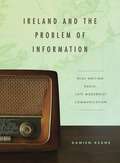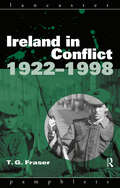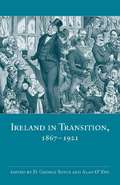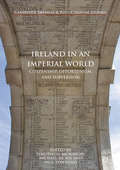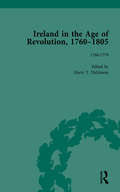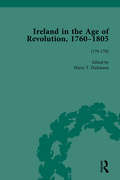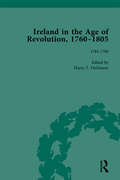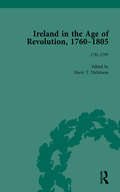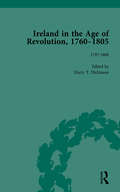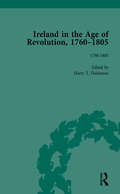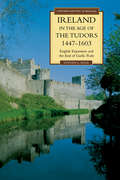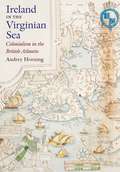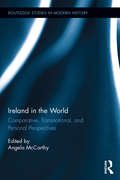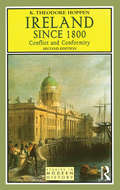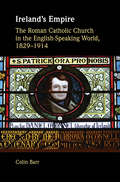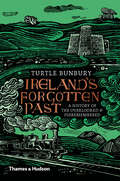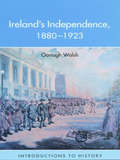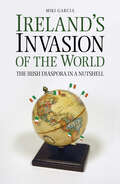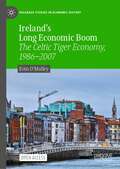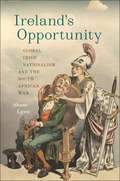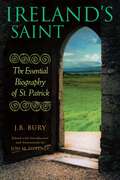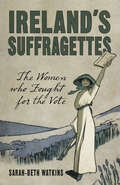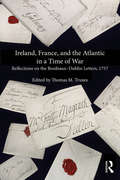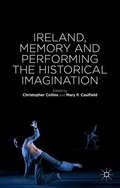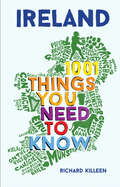- Table View
- List View
Ireland and the Problem of Information: Irish Writing, Radio, Late Modernist Communication (Refiguring Modernism)
by Damien KeaneThough the work of Irish writers has been paramount in conventional accounts of literary modernism, Ireland itself only rarely occupies a meaningful position in accounts of modernism’s historical trajectory. With an itinerary moving not simply among Dublin, Belfast, and London but also Paris, New York, Addis Ababa, Rome, Berlin, Geneva, and the world’s radio receivers, Ireland and the Problem of Information examines the pivotal mediations through which social knowledge was produced in the mid-twentieth century. Organized as a series of cross-fading case studies, the book argues that an expanded sphere of Irish cultural production should be read as much for what it indicates about practices of intermedial circulation and their consequences as for what it reveals about Irish writing around the time of the Second World War. In this way, it positions the “problem of information” as, first and foremost, an international predicament, but one with particular national implications for the Irish field.
Ireland in Conflict 1922-1998 (Lancaster Pamphlets)
by T. G. FraserIreland in Conflict, 1922-1998 sets out the main political, economic and social developments in Ireland, north and south of the border, since the 1922 treaty. This book explains the troubles in their context and examines the underlying tensions which led to prolonged violence after a period of relative civil peace and rising prosperity. Ireland in Conflict discusses: * the Civil War, its legacy for Irish politics and the Boundary Commission* the IRA, Orange Order and the Unionist party* the role of the Catholic Church and the Protestant minority* escalation of violence in the 1970s including Bloody Sunday and the hunger strikes* the Anglo-Irish agreement, the cease-fire and the hope for a peaceful solution.
Ireland in Transition, 1867-1921
by Alan O’Day D. George BoyceThis wide-ranging collection brings together multiple perspectives on a key period in Irish history, from the Fenian Rising in 1867 to the creation of the Irish Free State and Northern Ireland in 1921, with a focus on the formation of Irish identity. The chapters, written by team of experts, focus on key individuals or ideological groups and consider how they perceived Ireland's future, what their sense of Irish identity was, and who they saw as the enemy. Providing a new angle on Ireland during the period from 1867 to 1921, this book will be important reading for all those with an interest in Irish history.
Ireland in an Imperial World
by Michael De Nie Timothy G. Mcmahon Paul TownendIreland in an Imperial World interrogates the myriad ways through which Irish men and women experienced, participated in, and challenged empires in the nineteenth and twentieth centuries. Most importantly, they were integral players simultaneously managing and undermining the British Empire, and through their diasporic communities, they built sophisticated arguments that aided challenges to other imperial projects. In emphasizing the interconnections between Ireland and the wider British and Irish worlds, this book argues that a greater appreciation of empire is essential for enriching our understanding of the development of Irish society at home. Moreover, these thirteen essays argue plainly that Ireland was on the cutting edge of broader global developments, both in configuring and dismantling Europe's overseas empires.
Ireland in the Age of Revolution, 1760–1805, Part I, Volume 1
by Harry T DickinsonThe latter half of the eighteenth-century saw Irish opposition movements being greatly influenced by the American and French revolutions. This two-part, six-volume edition illustrates the depth and reach of this influence by publishing pamphlets dealing with the major political issues of these decades.
Ireland in the Age of Revolution, 1760–1805, Part I, Volume 2
by Harry T DickinsonThe latter half of the eighteenth-century saw Irish opposition movements being greatly influenced by the American and French revolutions. This two-part, six-volume edition illustrates the depth and reach of this influence by publishing pamphlets dealing with the major political issues of these decades.
Ireland in the Age of Revolution, 1760–1805, Part I, Volume 3
by Harry T DickinsonThe latter half of the eighteenth-century saw Irish opposition movements being greatly influenced by the American and French revolutions. This two-part, six-volume edition illustrates the depth and reach of this influence by publishing pamphlets dealing with the major political issues of these decades.
Ireland in the Age of Revolution, 1760–1805, Part II, Volume 4
by Harry T DickinsonThe latter half of the eighteenth-century saw Irish opposition movements being greatly influenced by the American and French revolutions. This two-part, six-volume edition illustrates the depth and reach of this influence by publishing pamphlets dealing with the major political issues of these decades.
Ireland in the Age of Revolution, 1760–1805, Part II, Volume 5
by Harry T DickinsonThe latter half of the eighteenth-century saw Irish opposition movements being greatly influenced by the American and French revolutions. This two-part, six-volume edition illustrates the depth and reach of this influence by publishing pamphlets dealing with the major political issues of these decades.
Ireland in the Age of Revolution, 1760–1805, Part II, Volume 6
by Harry T DickinsonThe latter half of the eighteenth-century saw Irish opposition movements being greatly influenced by the American and French revolutions. This two-part, six-volume edition illustrates the depth and reach of this influence by publishing pamphlets dealing with the major political issues of these decades.
Ireland in the Age of the Tudors, 1447-1603: English Expansion and the End of Gaelic Rule (Longman History of Ireland)
by Steven G. EllisThe second edition of Steven Ellis's formidable work represents not only a survey, but also a critique of traditional perspectives on the making of modern Ireland. It explores Ireland both as a frontier society divided between English and Gaelic worlds, and also as a problem of government within the wider Tudor state. This edition includes two major new chapters: the first extending the coverage back a generation, to assess the impact on English Ireland of the crisis of lordship that accompanied the Lancastrian collapse in France and England; and the second greatly extending the material on the Gaelic response to Tudor expansion.
Ireland in the Virginian Sea
by Audrey HorningIn the late sixteenth century, the English started expanding westward, establishing control over parts of neighboring Ireland as well as exploring and later colonizing distant North America. Audrey Horning deftly examines the relationship between British colonization efforts in both locales, depicting their close interconnection as fields for colonial experimentation. Focusing on the Ulster Plantation in the north of Ireland and the Jamestown settlement in the Chesapeake, she challenges the notion that Ireland merely served as a testing ground for British expansion into North America. Horning instead analyzes the people, financial networks, and information that circulated through and connected English plantations on either side of the Atlantic. In addition, Horning explores English colonialism from the perspective of the Gaelic Irish and Algonquian societies and traces the political and material impact of contact. The focus on the material culture of both locales yields a textured specificity to the complex relationships between natives and newcomers while exposing the lack of a determining vision or organization in early English colonial projects.
Ireland in the World: Comparative, Transnational, and Personal Perspectives (Routledge Studies in Modern History #16)
by Angela McCarthyThis international edited book collection of ten original contributions from established and emerging scholars explores aspects of Ireland’s place in the world since the 1780s. It imaginatively blends comparative, transnational, and personal perspectives to examine migration in a range of diverse geographical locations including Ireland, Scotland, Wales, Australia, New Zealand, the United States, Canada, Argentina, Jamaica, and the British Empire more broadly. Deploying diverse sources including letters, interviews, press reports, convict records, and social media, contributors canvas important themes such as slavery, convicts, policing, landlordism, print culture, loyalism, nationalism, sectarianism, politics, and electronic media. A range of perspectives including Catholic and Protestant, men and women, convicts and settlers are included, and the volume is accompanied by a range of striking images.
Ireland since 1800: Conflict and Conformity (Studies In Modern History)
by K. Theodore HoppenThe second edition of this bestselling survey of modern Irish history covers social, religious as well as political history and offers a distinctive combination of chronological and thematic approaches.
Ireland's Empire: The Roman Catholic Church in the English-Speaking World, 1829–1914
by Colin BarrHow did the Irish stay Irish? Why are Irish and Catholic still so often synonymous in the English-speaking world? Ireland's Empire is the first book to examine the complex relationship between Irish migrants and Roman Catholicism in the nineteenth century on a truly global basis. Drawing on more than 100 archives on five continents, Colin Barr traces the spread of Irish Roman Catholicism across the English-speaking world and explains how the Catholic Church became the vehicle for Irish diasporic identity in the United States, Australia, Canada, South Africa, New Zealand, Newfoundland, and India between 1829 and 1914. The world these Irish Catholic bishops, priests, nuns, and laity created endured long into the twentieth century, and its legacy is still present today.
Ireland's Forgotten Past: A History Of The Overlooked And Disremembered
by Turtle BunburyThis volume delves into Ireland’s forgotten history bringing to light some of the most colorful characters and intriguing episodes of the country’s long history. Ireland is approximately the size of the state of Indiana, yet this small country boasts an extensive, rich, and fascinating history. Ireland’s Forgotten Past is an alternative history that covers 13,000 years in 36 stories that are often left out of history books. Among the characters in these absorbing accounts are a pair of ill- fated prehistoric chieftains, a psychopathic Viking, a gallant Norman knight, a dazzling English traitor, an ingenious tailor, an outstanding war-horse, a brothel queen, an insanely prolific sculptor, and a randy prince. This volume offers a succinct account of the Stone Age and Bronze Age, as well as insights into the Bell-Beakers, the Romans, and the Knights Templar. Historian Turtle Bunbury writes a gently off-beat take on monumental events like the Wars of the Roses, the Tudor Conquest and the Battle of the Boyne, as well as the Home Rule campaign and the Great War. Ireland’s Forgotten Past adds color to the existing histories of the country by focusing on the unique characters and intriguing events. This volume will delight anyone interested in the rich untold history of Ireland.
Ireland's Independence: 1880-1923 (Introductions To History Ser.)
by Oonagh WalshFirst published in 2004. Routledge is an imprint of Taylor & Francis, an informa company.
Ireland's Invasion of the World: The Irish Diaspora in a Nutshell
by Miki GarciaFor much of Ireland’s history her people have been emigrating and the Irish Diaspora today is estimated to be over 100 million people, many times larger than the current population of Ireland. For the most part they scattered not as colonizers but as migrants, they took their culture and identity with them and made a mark on their adopted county. They fought wars, formed societies, shaped cultures, created new identities and made history. This book looks at the Irish contribution to the story of all five continents, recalling unsung heroes, tragic tales and forgotten legacies.
Ireland's Long Economic Boom: The Celtic Tiger Economy, 1986–2007 (Palgrave Studies in Economic History)
by Eoin O'MalleyThis Open Access book examines the long economic boom experienced in Ireland between the late 1980s and 2007, analysing why this boom occurred. The book situates Ireland as a relative latecomer to economic development, with specific challenges and advantages inherent to this position. It discusses the risks involved in remaining reliant on foreign companies, exploring how in Ireland’s case the rapidly growing economy required active, interventionist and imaginative policy measures rather than relying primarily on free market forces. The book also offers an estimation of the value of the net foreign earnings associated with different categories of exports after deducting the profit outflows and payments for imported inputs, revealing a number of findings about the importance of Irish indigenous companies and services during this time. It shows that Irish indigenous companies, assisted by industrial policy measures, played a significant part, as did the services sector,alongside the more visible and widely recognised role of foreign multinationals in high-tech manufacturing. Offering fresh insights and analyses more than 15 years after the long boom ended at the precipice of the global financial crisis, this book will be a useful resource for economic historians, scholars of political economy and macroeconomic policy, as well as those interested in modern Irish history more broadly.
Ireland's Opportunity: Global Irish Nationalism and the South African War (The Glucksman Irish Diaspora Series)
by Shane LynnHow the South African War transformed nationalist politics across Ireland’s global diasporaIn 1899, the British Empire embarked on a deeply controversial war against two small Boer Republics in South Africa. To many Irish nationalists, the Boers were fellow victims of British mistreatment. Defeat for the Boers, they worried, would mean defeat for the principle that small, white nations like Ireland were entitled to govern themselves. Widespread outrage sparked a dramatic resurgence in Irish nationalism after a decade of disunity and decline.The shape and strength of this revival varied throughout Ireland’s vast global diaspora. Ireland’s Opportunity traces the impact of “Boer fever” across Ireland and the diaspora networks that connected Irish communities in the United States, Canada, Australia, and New Zealand.Home Rulers reunited to oppose the war, even as those in Britain’s colonies asserted their loyalty to the empire and its racist underpinnings. Fenian revolutionaries, meanwhile, saw “England’s difficulty” in South Africa as “Ireland’s opportunity” to strike for independence. Explosive conspiracies hatched in Ireland and the United States failed to kindle the desired revolution. But the lessons and legacies of the South African War years would shape their fateful response when “England’s difficulty” returned after 1914.Blending global perspectives with intimate portraits of individuals whose lives were forever changed by the war, Shane Lynn reveals how Irish nationalism was a global phenomenon with a tangled and paradoxical relationship to empire.
Ireland's Saint: The Essential Biography of St. Patrick
by Jon M. Sweeney J. B. BuryExplore Patrick's place in history, the spread of Christianity beyond the Roman Empire, how Patrick first came to Ireland, the influence of the earlier Palladius on Patrick's work, political and social conditions at that time, and the spiritual battles with the Druids. This 21st century edition includes notes from other notable biographers, mystics, historians, and storytellers of Ireland and is an ideal place to begin any exploration of this much loved but little-known saint.[This book was previously published in hardcover and trade paperback and is now available in this smaller format, with a new cover design, for the first time.]
Ireland's Suffragettes: The Women Who Fought for the Vote
by Sarah-Beth WatkinsIreland's Suffragettes is a collection of biographical essays introducing the suffragettes who influenced Ireland's struggle for women's rights. Many of the women were political activists while others became militant suffragettes between 1912 and 1914. The struggle of the suffragettes is different to that of the UK, in that many Irish suffragettes were also included in the struggle for independence and the inclusion of women in the trade unions movement. Drawing on primary sources located in the National Archives and the National Library, Ireland's Suffragettes will bring to life not only the most famous names in the suffragette movement but also the other women who made women's rights their lives work.
Ireland, France, and the Atlantic in a Time of War: Reflections on the Bordeaux–Dublin Letters, 1757
by Thomas M. TruxesIn March 1757 – early in the Seven Years’ War – a British privateer intercepted an Irish ship, the Two Sisters of Dublin, as it returned home from Bordeaux with a cargo of wine and French luxury goods. Amongst the cargo seized were 125 letters from members of the Irish expatriate community, which were to lay undisturbed in the British archives for the next 250 years. Re-discovered in 2011 by Dr. Truxes, this cache of (mostly unopened) letters provides a colorful, intimate, and revealing glimpse into the lives of ordinary people caught up in momentous events. Taking this correspondence (published by the British Academy in 2013) as a shared starting point, the ten essays in this volume are not so much "about" the Bordeaux–Dublin letters themselves, but rather reflect upon themes, perspectives, and questions embedded within the mail of ordinary men, women, and children cut off from home by war. The volume’s introduction situates these essays within a broad Atlantic context, allowing the succeeding chapters to explore a range of topics at the cutting edge of early-modern British and Irish historical scholarship, including women in the early-modern world, the consequences of war across all classes in society, the eighteenth-century penal laws and their impact, and Irish expatriate communities on the European continent. Leavening these broad themes with the personal snapshots of life provided by the Bordeaux-Dublin letters, this edited collection enlarges, complicates, and challenges our understanding of the mid-eighteenth-century Atlantic world.
Ireland, Memory and Performing the Historical Imagination
by Christopher Collins Mary P. CaulfieldThis book explores the performance of Irish collective memories and forgotten histories. It proposes an alternative and more comprehensive criterion of Irish theatre practices. These practices can be defined as the 'rejected', contested and undervalued plays and performativities that are integral to Ireland's political and cultural landscapes.
Ireland: 1001 Things You Need to Know
by Richard KilleenIn this enthralling celebration of the places and people that make the country unique, Richard Killeen takes the reader on a tour of Ireland that reveals its rich and surprising history, including its heroes and villains, legends and folklore. As well as exploring the nation's rich literary and sporting heritage, Ireland: 1,001 Things You Need to Know also reveals the best of the country for those visiting today, from Dublin pubs to the nation's finest beaches. This captivating miscellany holds a treasure trove of information that tells the story of this alluring and bewitching country anew.
